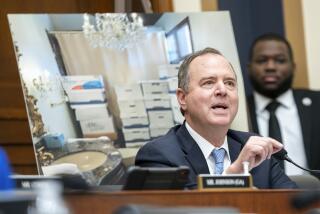Senate control may hinge on fights over guns, immigration, budget
WASHINGTON — Action in Washington over the next few months on gun control, immigration and fiscal policy will set the stage for a fierce midterm election battle next year, with control of Congress the ultimate prize.
Republicans are expected to keep their majority in the House, and history would suggest they might expand their numbers in the sixth year of a two-term presidency.
But the Democrats’ hold on the Senate is at risk, with competitive 2014 contests for at least nine of their seats — seven in states Mitt Romney carried in 2012. Republicans would need a net gain of six seats to overturn the Democrats’ 55-45 edge.
Voters in those Republican states will be watching as their Democratic senators tackle polarizing issues such as citizenship rights for illegal immigrants, spending levels for social welfare programs and new restrictions on firearms. How the lawmakers line up could well influence their own futures, as well as the fate of President Obama’s second-term agenda.
“I am sure that [they] can’t wait to have a vote on assault weapons on the Senate floor,” Jim Manley, a former aide to Majority Leader Harry Reid, said of Minority Leader Mitch McConnell and the Republican National Committee.
In fact, both parties will be seizing on votes that can become fodder for 30-second attack ads in the races to come. One group trying to block the nomination of former GOP Sen. Chuck Hagel of Nebraska as Obama’s Defense secretary is already airing ads in five Republican states where Democratic senators face reelection in 2014.
In an effort to shield fellow Democrats from having to cast politically damaging votes, Reid will employ his power to shape the way legislation is considered on the Senate floor.
“His goal is to look out for the caucus as a whole,” Manley said.
How issues like gun control and immigration play out, in broad terms, will frame the contours of the 2014 election.
“What we talk about over the next two years will go a long way to define the choice for voters,” said Stu Rothenberg, who handicaps congressional elections for the nonpartisan Rothenberg Political Report. “Is it going to be about debt, deficits and spending, as the Republicans want it to be? Or is it going to be about the White House bringing change on immigration, economic revival and the stock market going up? “
On gun control, Obama and the Democrats are eager to make progress on an issue that has been at a stalemate for decades. “From a general election point of view, I think the details are less important than the president accomplishing something, even if it falls short of what the gun control people want,” Rothenberg said.
Reid’s emphasis will be “to help Sen. [Dianne] Feinstein put together a package, while also making sure that those who are up in 2014 are protected from politically perilous votes,” Manley said. Reid has said that if the assault weapons ban the California Democrat is seeking is not included in a broad gun control measure, she will be able to offer it as an amendment.
On immigration, Obama is pressing for a bill to aid illegal immigrants that will also try to cement Democrats’ advantage among Latinos, which has contributed greatly to his two presidential victories. Not by accident was the president’s immigration speech last week sited in Nevada, one of a handful of formerly Republican states where Democrats have benefited from Latino votes.
The issue may be more fraught than gun control for Republicans, who will be trying to manage the discussion so that they seem sympathetic to Latino voters, while also allaying some conservatives’ concerns about the issue.
Still, the 2014 lineup of Senate elections works to the GOP’s advantage. Democrats will be defending more seats (21) than Republicans (14), pending a special election in Massachusetts to fill a vacancy created when John F. Kerry became secretary of State. Democratic Gov. Deval Patrick filled it temporarily by appointing William “Mo” Cowan, a former aide, to serve as interim senator until an election this summer.
With former Republican Sen. Scott Brown’s decision last week not to run for the seat, Democrats are favored to hold it.
Recent retirement announcements by a pair of Democratic senators have already weakened their party’s chances of keeping their seats. Republicans are favored to pick up the seat of John D. Rockefeller IV in West Virginia, and the Iowa contest for Tom Harkin’s seat is a tossup.
“Beating incumbent senators is not easy,” said Rob Jesmer, former executive director of the National Republican Senatorial Committee. “That’s why having open seats makes it such a huge deal.”
The most vulnerable Democratic incumbent appears to be Sen. Tim Johnson of South Dakota, no better than an even bet for reelection against Republican Mike Rounds, a former governor. Other Democrats at risk include Sens. Mary L. Landrieu of Louisiana, Mark Pryor of Arkansas, Max Baucus of Montana, Mark Begich of Alaska and Kay Hagan of North Carolina. All of them reside in states where voters tend to hold conservative views on issues like gun control and immigration.
In contrast, none of the 2014 seats held by Republicans is considered particularly vulnerable. Sen. Saxby Chambliss of Georgia, who faced a potential conservative primary challenge, recently announced that he would retire, but his seat is likely to remain in Republican hands. The same is true for other reliably Republican seats held by incumbents who may be challenged from the right in primaries, such as Lindsey Graham of South Carolina.
The best chance for a Democratic pickup next year could be in Maine, where moderate Sen. Susan Collins is favored to win reelection but may retire. National Democrats are talking up what they say is McConnell’s vulnerability in Kentucky, but Republicans and independent analysts say he’s unlikely to be unseated.
More to Read
Start your day right
Sign up for Essential California for news, features and recommendations from the L.A. Times and beyond in your inbox six days a week.
You may occasionally receive promotional content from the Los Angeles Times.






